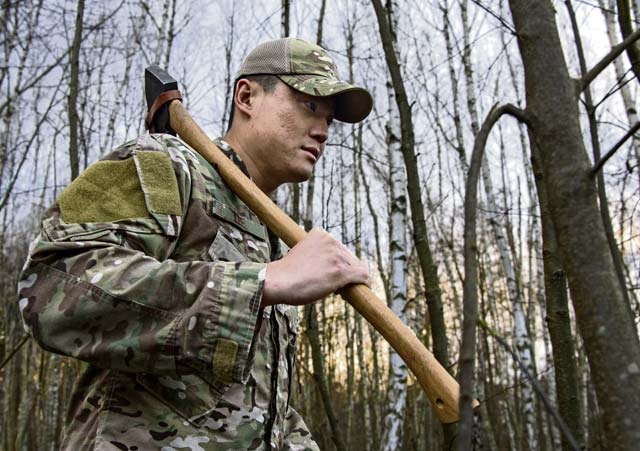
Humans are designed to survive. Yet, history has shown that when stranded in survival setting, there have been some who made it out alive and some who did not. Perhaps, while some cannot change their outcome, some can.
Tech. Sgt. Lee Young, is the 86th Operations Group Survival, Evasion, Resistance, and Escape noncommissioned officer in charge. As a SERE instructor, Lee teaches survival techniques to air crew, special operations personnel, and other military members who are at high risk of isolation. From his experience, Lee concludes that survival is mostly in the mind.
“Survival is 10 percent physical and 90 percent mental,” Lee said. “(It takes) someone who’s mentally strong and has the willpower to endure. These are the people who make it out of a survival situation. You need food and water, but if you don’t have that mental strength and you quit within the first few days, then your life is over.”
The Air Force takes survival training very seriously, and has built the modern SERE program with years of real-world experience from former prisoners of war and other survivors.
To train others to survive, Lee had to gain his own experience and become a survivor. He witnessed the limits of his mental and physical endurance during the SERE instructor course, part of which placed him in the woods with several teammates and forced him to endure bitter cold, an overburdening amount of tasks, and small meal portions all on a minimal amount of sleep. Lee’s class dropped from 65 to 35 participants within the first three weeks.
“The most intense experience I’ve had with isolation was the first 10 days in the woods during the SERE instructor course,” Lee said. “Days four, five, and six were the three most miserable days of my life.”
Due to the excessive tasks and minimal food, Lee lost 30 pounds during those first 10 days.
“I’ll paint a picture for you,” Lee said. “You can’t get warm even in your sleeping bag, and that’s if you make it to your sleeping bag. You don’t even get undressed before you get into it, except for your boots. When you wake up it’s negative 20 degrees, your clothes are wet, you’re miserable, cold, tired, and hungry. Your boots are frozen solid so you have to hit them on a tree and knock all the ice off. Every muscle and joint in your body hurts to the point where you feel like you can’t walk anymore. I couldn’t make a fist, I had no dexterity. I was dehydrated. It was just miserable and cold.”
Lee said those who failed allowed the situation to get in their heads. Thinking about going home to a warm bed weakens a person’s mental state.
“Usually, the ones who quit decide at 1 or 2 in the morning when they were miserable, doing tasks,” Lee said.
Lee said that controlling his mental state is what got him through his training. He said that there were three things he focused on to keep himself on track.
“When I think I have it bad, someone always has it worse,” Lee said. “It doesn’t matter how bad the situation is; somewhere in the world, someone has it worse. The second thing that got me through was knowing that it wasn’t impossible. If others can do it, why can’t I do it? The third thing was knowing that I couldn’t look a man in the eye and say ‘I quit.’ If he can do it, why can’t I do it? That would be saying ‘I’m not as good as you are.’”
Lee also refused to be overwhelmed by the magnitude of his tasks.
“It takes small victories,” Lee said. “Every morning when you wake up, you just want to go home and take a hot shower, but you get up and set a goal. Like, let me just make it to breakfast. Then let’s just make it to lunch, then let’s make it to four o’clock when cadre leaves. Then you complete your tasks. By that time it’s like 4:30 a.m. and you do it all over again. You just keep pushing. You have your teammates there to help you out and push you through.”


